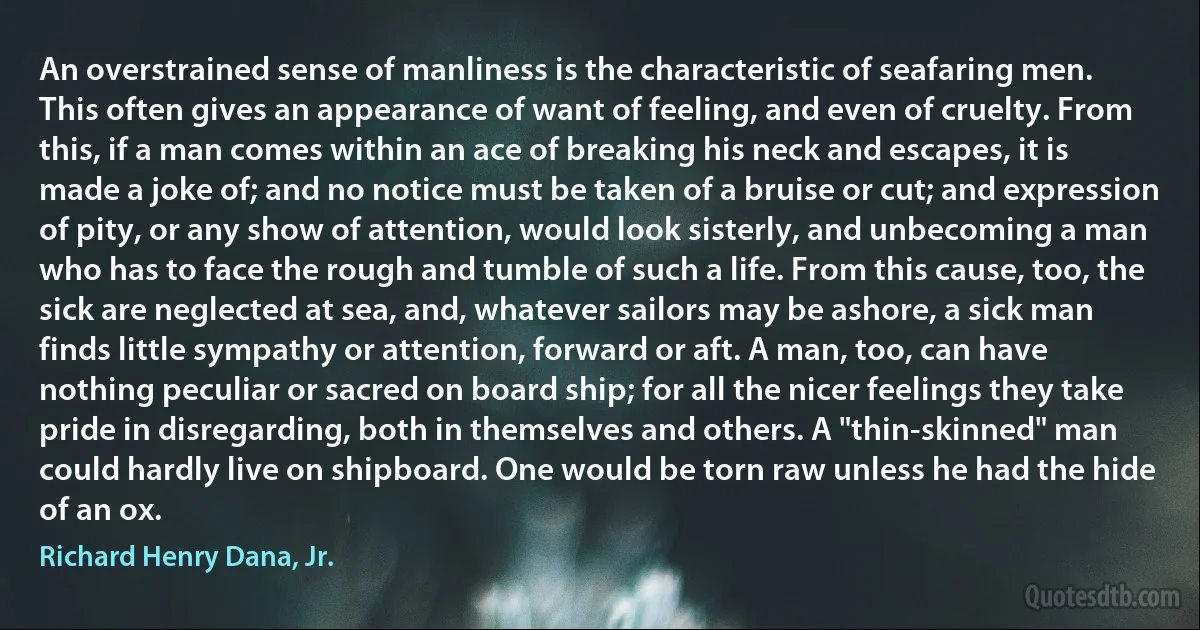
An overstrained sense of manliness is the characteristic of seafaring men. This often gives an appearance of want of feeling, and even of cruelty. From this, if a man comes within an ace of breaking his neck and escapes, it is made a joke of; and no notice must be taken of a bruise or cut; and expression of pity, or any show of attention, would look sisterly, and unbecoming a man who has to face the rough and tumble of such a life. From this cause, too, the sick are neglected at sea, and, whatever sailors may be ashore, a sick man finds little sympathy or attention, forward or aft. A man, too, can have nothing peculiar or sacred on board ship; for all the nicer feelings they take pride in disregarding, both in themselves and others. A "thin-skinned" man could hardly live on shipboard. One would be torn raw unless he had the hide of an ox.
Richard Henry Dana, Jr.Related topics
appearance attention breaking cause characteristic comes cut face forward gives hide joke men life live man manliness neck nothing notice pity pride sea sense ship show sick take tear whatever othersRelated quotes
Yesterday I saw Mr. Thackeray. He dined here with some other gentlemen. He is a very tall man - above six feet high, with a peculiar face - not handsome, very ugly indeed, generally somewhat stern and satirical in expression, but capable also of a kind look. He was not told who I was, he was not introduced to me, but I soon saw him looking at me through his spectacles; and when we all rose to go down to dinner he just stepped quietly up and said "Shake hands”; so I shook hands. He spoke very few words to me, but when he went away he shook hands again in a very kind way. It is better, I should think, to have him for a friend than an enemy, for he is a most formidable-looking personage. I listened to him as he conversed with the other gentlemen. All he says is most simple, but often cynical, harsh, and contradictory.

Charlotte Brontë
The American two-party electoral system, with its ballyhoo and hoopla, its impresarios and stunt artists, is the greatest show on earth. Campaign time is show time, a veritable circus brought into our living rooms via television as a form of entertainment. The important thing is that the show must go on - because it is more than just a show. The two-party system electoral social order. It channels and limits political expression, and blunts class grievances. It often leaves little time for the real issues because it gives so much attention to the contest per se who will run? who is ahead? who will win the primaries? who will win the election? It provides the form of republican government with little of the substance. It fives the plutocratic system of appearance of popular participation while being run by and for a select handful of affluent contestants.

Michael Parenti
It had been the winter of 1835-6 that the ship, Alert, in her voyage for hides on the remote and almost unknown coast of California, floated into the vast solitude of the bay of San Francisco. All around was the stillness of nature. One vessel, a Russian, lay at anchor there, but during our whole stay not a sail came or went. Our trade was with remote missions, which sent hides to us in launches manned by their Indians... Over a region far beyond our sight there was no other human habitations, expect that an enterprising Yankee, years in advance of his time, had put up, on the rising ground above the landing, a shanty of rough boards, where he carried on a very small retail trade between the hide ships and the Indians. On the evening of Saturday, the thirteenth of August, 1859 (I again sailed into) the entrance to San Francisco, (now) the great center of worldwide commerce.

Richard Henry Dana, Jr.
He remembered how the night dew had fallen upon him,-how the dark forest had whispered to him,-how the stars had gleamed upon him,-a simple and loving man, watching his fire in the years gone by, and ever musing as it burned. He remembered with what tenderness, with what love and sympathy for mankind, and what pity for human guilt and woe, he had first begun to contemplate those ideas which afterwards became the inspiration of his life; with what reverence he had then looked into the heart of man, viewing it as a temple originally divine, and, however desecrated, still to be held as sacred to a brother; with what awful fear he had deprecated the success of his pursuit, and prayed that the Unpardonable Sin might never be revealed to him. Then ensued the base intellectual development which, in its progress, disturbed the counterpoise between his mind and heart.

Nathaniel Hawthorne
Determination in a single instance is an expression of courage; if it becomes characteristic, a mental habit. But here we are referring not to physical courage but to courage to accept responsibility, courage in the face of a moral danger. This has often been called courage d'esprit, because it is created by the intellect. That, however, does not make it an act of the intellect: it is an act of temperament. Intelligence alone is not courage; we often see that the most intelligent people are irresolute. Since in the rush of events a man is governed by feelings rather than by thought, the intellect needs to arouse the quality of courage, which then supports and sustains it in action.
Looked at in this way, the role of determination is to limit the agonies of doubt and the perils of hesitation when the motives for action are inadequate.

Carl von Clausewitz
